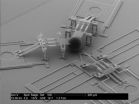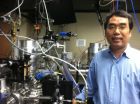(Press-News.org) Forgiving ourselves for hurting another is easier if we first make amends — thus giving our inner selves a "moral OK," according to Baylor University psychology researchers.
The research, published in The Journal of Positive Psychology, is significant because previous studies show that the inability to self-forgive can be a factor in depression, anxiety and a weakened immune system, researchers said.
"One of the barriers people face in forgiving themselves appears to be that people feel morally obligated to hang on to those feelings. They feel they deserve to feel bad. Our study found that making amends gives us permission to let go," said researcher Thomas Carpenter, a doctoral student in psychology in Baylor's College of Arts and Sciences.
The research article was based on two studies. In the first, 269 participants recalled diverse "real-world" offenses they had committed, ranging from romantic betrayals to physical injury to gossip to rejection. In the second study, 208 participants were asked about a hypothetical wrong.
In the first study, participants were asked how much they have forgiven themselves for an actual offense; how much they had tried such efforts as apology, asking forgiveness and restitution; how much they felt the other person had forgiven them; and how much they saw self-forgiveness as morally appropriate.
The more they made amends, the more they felt self-forgiveness was morally permissible. Further, receiving forgiveness appeared to help people feel it was morally all right to let go.
Researchers said one limitation of the first study was that the offenses varied from person to person. So to further test their hypotheses, in Study 2 they used a standardized hypothetical offense — failing to take the blame for the action that caused a friend's firing. This study revealed similar results to the first, although — unlike in Study 1 — receiving forgiveness from someone else had little effect on whether one forgave oneself.
The research also showed that the guiltier a person felt and the more serious the wrong, the less he or she was likely to self-forgive. Making amends also appeared to help people self-forgive by reducing those feelings, the researchers found. Also, women were generally less self-forgiving than men.
Self-forgiveness may be "morally ambiguous territory," researchers wrote, and "individuals may, at times, believe that they deserve to continue to pay for their wrongs." But by making amends, they may be able to "tip the scales of justice."
INFORMATION:
Funding for the research was supported in part by a grant from the Fetzer Institute. Study co-authors are Jo-Ann Tsang, Ph.D., associate professor of psychology and neuroscience in Baylor's College of Arts and Sciences; and Robert D. Carlisle, Ph.D., an analyst at Mesa Public Schools and formerly of the department of psychology and neuroscience at Baylor.
Letting it go: Take responsibility, make amends and forgive yourself
A 'moral ok' is needed for self-pardon, Baylor University study finds
2014-05-13
ELSE PRESS RELEASES FROM THIS DATE:
UT Dallas team creates flexible electronics that change shape inside body
2014-05-13
Researchers from The University of Texas at Dallas and the University of Tokyo have created electronic devices that become soft when implanted inside the body and can deploy to grip 3-D objects, such as large tissues, nerves and blood vessels.
These biologically adaptive, flexible transistors might one day help doctors learn more about what is happening inside the body, and stimulate the body for treatments.
The research, available online and in an upcoming print issue of Advanced Materials, is one of the first demonstrations of transistors that can change shape and ...
Radiation from early universe found key to answer major questions in physics
2014-05-13
Astrophysicists at UC San Diego have measured the minute gravitational distortions in polarized radiation from the early universe and discovered that these ancient microwaves can provide an important cosmological test of Einstein's theory of general relativity. These measurements have the potential to narrow down the estimates for the mass of ghostly subatomic particles known as neutrinos.
The radiation could even provide physicists with clues to another outstanding problem about our universe: how the invisible "dark matter" and "dark energy," which has been undetectable ...
Smart drugs pose special risks to the developing brain of young people
2014-05-13
Over a million American students misuse prescription drugs or take illegal stimulants to increase their attention span, memory, and capacity to stay awake. Such "smart drugs" become more and more popular due to peer pressure, stricter academic requirements, and the tight job market. But young people who misuse them risk long-term impairments to brain function, warn Kimberly Urban at the University of Delaware and Wen-Jun Gao at Drexel University College of Medicine, USA, in a NIH-funded review published in the open-access journal Frontiers in Systems Neuroscience.
The ...
The physics of ocean undertow
2014-05-13
WASHINGTON D.C. May 13, 2014 -- People standing on a beach often feel the water tugging the sand away from under their feet. This is the undertow, the current that pulls water back into the ocean after a wave breaks on the beach.
Large storms produce strong undertows that can strip beaches of sand. By predicting how undertows interact with shorelines, researchers can build sand dunes and engineer other soft solutions to create more robust and sustainable beaches.
"Formulation of the Undertow Using Linear Wave Theory," a new paper in the journal Physics of Fluids, clears ...
MEMS nanoinjector for genetic modification of cells
2014-05-13
WASHINGTON D.C. May 13, 2014 -- The ability to transfer a gene or DNA sequence from one animal into the genome of another plays a critical role in a wide range of medical research—including cancer, Alzheimer's disease, and diabetes.
But the traditional method of transferring genetic material into a new cell, called "microinjection," has a serious downside. It involves using a small glass pipette to pump a solution containing DNA into the nucleus of an egg cell, but the extra fluid can cause the cell to swell and destroy it—resulting in a 25 to 40 percent cell death rate.
Now, ...
Why athletes are more likely to need pacemakers in old age
2014-05-13
A new study by The University of Manchester has shed light on why athletes are more likely to have abnormal heart rhythms.
Elderly athletes with a lifelong history of training and competing in endurance events like marathons, triathlons and iron man challenges can have heart rhythm disturbances, known as arrhythmias.
The Manchester research in rodents, funded by the British Heart Foundation, shows molecular changes in the heart's pacemaker occur in response to exercise training.
The finding, reported in Nature Communications, overturns the commonly held belief that ...
Study: state VAMS don't reflect content, quality of teachers' instruction
2014-05-13
WASHINGTON, D.C., May 13, 2014—New research published online today in Educational Evaluation and Policy Analysis (EEPA), a peer-reviewed journal of the American Educational Research Association, finds weak to nonexistent relationships between state-administered value-added model (VAM) measures of teacher performance and the content or quality of teachers' instruction. Based on their results, the authors question whether VAM data will be useful in evaluating teacher performance and shaping classroom instruction.
VIDEO: Co-author Morgan S. Polikoff discusses key findings ...
Ultrafast laser technique developed to observe electron action
2014-05-13
University of Central Florida physicist Zenghu Chang has done it again. For a third time this year, his research group has published an article in a Nature journal.
This time, Chang and his team have developed a new ultrafast light source for observing electron motion in molecules – made up of nuclei and electrons – at the point before the nuclei start to move. By being able to observe what actually happens, scientists can begin to understand how an electron interacts with other electrons, which may help improve the efficiency of solar cells.
"The charge migration that ...
Released prisoners are more likely to suffer early death
2014-05-13
Men who have been incarcerated and released are more than twice as likely to die prematurely as those who have not been imprisoned, according to a new study published by Georgia State University criminologist William Alex Pridemore.
Former prisoners are more likely to die early from infectious and respiratory diseases, drug overdoses and homicides. Causes of this "mortality penalty" include increased exposure to diseases like TB and HIV, the prolonged stress of the prison environment, the disruption of important social bonds and, upon release, the struggle to reintegrate ...
Forgiving a wrong may actually make it easier to forget
2014-05-13
We're often told to "forgive and forget" the wrongs that we suffer – it turns out that there may be some scientific truth behind the common saying. A study from researchers at the University of St. Andrews in Scotland shows that the details of a transgression are more susceptible to forgetting when that transgression has been forgiven.
The findings are published in Psychological Science, a journal of the Association for Psychological Science.
"It is well established that learning to forgive others can have positive benefits for an individual's physical and mental health," ...
LAST 30 PRESS RELEASES:
Researchers develop new strategy for improving inverted perovskite solar cells
Yes! The role of YAP and CTGF as potential therapeutic targets for preventing severe liver disease
Pancreatic cancer may begin hiding from the immune system earlier than we thought
Robotic wing inspired by nature delivers leap in underwater stability
A clinical reveals that aniridia causes a progressive loss of corneal sensitivity
Fossil amber reveals the secret lives of Cretaceous ants
Predicting extreme rainfall through novel spatial modeling
The Lancet: First-ever in-utero stem cell therapy for fetal spina bifida repair is safe, study finds
Nanoplastics can interact with Salmonella to affect food safety, study shows
Eric Moore, M.D., elected to Mayo Clinic Board of Trustees
NYU named “research powerhouse” in new analysis
New polymer materials may offer breakthrough solution for hard-to-remove PFAS in water
Biochar can either curb or boost greenhouse gas emissions depending on soil conditions, new study finds
Nanobiochar emerges as a next generation solution for cleaner water, healthier soils, and resilient ecosystems
Study finds more parents saying ‘No’ to vitamin K, putting babies’ brains at risk
Scientists develop new gut health measure that tracks disease
Rice gene discovery could cut fertiliser use while protecting yields
Jumping ‘DNA parasites’ linked to early stages of tumour formation
Ultra-sensitive CAR T cells provide potential strategy to treat solid tumors
Early Neanderthal-Human interbreeding was strongly sex biased
North American bird declines are widespread and accelerating in agricultural hotspots
Researchers recommend strategies for improved genetic privacy legislation
How birds achieve sweet success
More sensitive cell therapy may be a HIT against solid cancers
Scientists map how aging reshapes cells across the entire mammalian body
Hotspots of accelerated bird decline linked to agricultural activity
How ancient attraction shaped the human genome
NJIT faculty named Senior Members of the National Academy of Inventors
App aids substance use recovery in vulnerable populations
College students nationwide received lifesaving education on sudden cardiac death
[Press-News.org] Letting it go: Take responsibility, make amends and forgive yourselfA 'moral ok' is needed for self-pardon, Baylor University study finds


